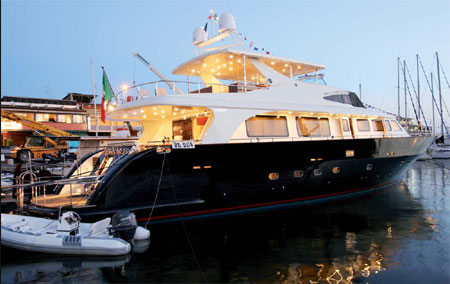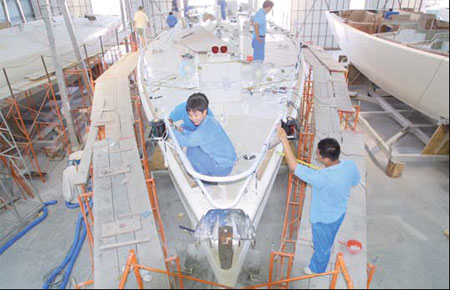New wave of luxury
Updated: 2012-02-10 09:37
By Lu Chang (China Daily)
|
||||||||
|
|
From its sleek lines and modern design to its rugged name, the 65-foot Alaska yacht is remarkably similar to luxury yachts made in Europe and the United States, except for one major difference: the price. Assembled in Shanghai, the Alaska line of yachts from Shanghai Double Happiness Yacht Co costs half of what it would typically cost for a yacht from an international manufacturer such as US-based Brunswick Boat Group.
Foreign-made boats, according to the Chinese shipbuilder, carry an average price tag of 20 million yuan ($3.17 million, 2.5 million euros), but the price includes the hefty 43-percent tax that foreign shipbuilders need to pay to import their boats into China.
Like the auto industry in China, where more Chinese companies have teamed up with foreign carmakers, the shipbuilding industry in the world's second biggest economy is learning that they also can't do it alone. For the Chinese shipbuilding industry, the Alaska yacht line is a pure example of that shift: it's cheaper, more high-end and similarly modernized but also full of foreign parts.
"The engine and spare parts are imported from Italy, England and the US. So technically they are of the same quality as international brands in terms of performance," says Zhou Juan, general manager of Shanghai Double Happiness. "The only difference is that we are much cheaper."
But another major difference is the target consumer. After years of disappointments trying to export their ships overseas and after the global economic downturn, Zhou says Shanghai Double Happiness and other shipbuilders like Hunan Sunbird Yacht Co Ltd and Kingship Marine Ltd, which is based in Hong Kong, have turned their attention to the growing number of affluent Chinese.
In an attempt to show how his company's ships are more oriented to Chinese tastes, he says the Alaska line is equipped with a karaoke system, cigar bar and a cabin-converted lounge.
According to the China Cruise & Yacht Industry Association (CCYIA), there are about 350 shipbuilders in China, including approximately 20 producers of super yachts, which measure more than 80 feet in length. All told, the Chinese shipbuilders generated 2.7 billion yuan (about $429 million) in revenue in 2010; shipbuilders worldwide generated about $3.4 billion in revenue. The association said it does not have the total number of boats sold in China for that year.
At Shanghai Double Happiness' 21,800-square-meter shipyard, several vessels are being built simultaneously, from 40-foot boats to 86-foot yachts with price tags ranging from 5 million yuan to 30 million yuan.
There are currently 200 workers making 20 boats a year.
"The most competitive advantage in China's yacht industry is still the lower cost of its skilled workforce," Zhou says, "because it can take as long as 8 months or even one-and-half years to build a boat, consuming thousands of hours."
While labor may be cheaper in China, the process of building yachts is relatively new to the nation, which is why many boat builders have turned to international help.
All the designs for Shanghai Double Happiness, for example, are imported. The company worked with Ed Dubois, a fellow of the Royal Institute of Naval Architects and the Royal Academy of Engineering, to design its ships. It also hired foreign engineers to work on the production, repair and maintenance of its ships.
|
|
"The craft of yacht-building is very complex and delicate, which needs lots of yacht-making professionals, so many Chinese companies have to make up for that by working with foreign companies or hiring foreign technicians," says Cheng Juehao, a professor from Shanghai Maritime University.
In addition to cheaper labor, another advantage for Chinese yacht companies over international ship companies located in China is the after-sales services.
"We have the shipyard here, we have storage for spare parts, and we have all kinds of professional technicians to take care of repair and maintenance," Zhou says. "This is something that international companies lack in providing a better service."
International boat builders, however, say they don't feel threatened. Zhang Yao, general manager with the Chinese division of the Brunswick Boat Group, the world's largest yacht producer, see China's yacht market "is dominated and will be dominated by international yacht makers for at least 10 years".
"We don't feel threatened by domestic boat builders. Actually there is no competition at all because international brands still hold most of the market share," Zhang says.
"What is going on right now in the yacht industry is like what happened in the auto market 20 years ago. It will take about 10 years before the Chinese boat makers to catch up with their Western counterparts."
China's yacht industry may still be developing, but the growing appetite for luxury boats as the next status symbol among China's new tycoons has been a blessing for both domestic and international boat makers.
According to CCYIA, the market in China will reach 50 billion yuan to 100 billion yuan within the next 5 to 10 years.
Traugott Kaminski, a Shanghai-based agent for British yacht maker Sunseeker International, says that "for the Chinese buyer who can afford a luxury yacht, money is not an issue any more".
But Kaminski says the Chinese buyer right now still prefers international brands like they would with a Louis Vuitton bag or a Rolls Royce.
"We are targeting different group of people," Kaminski says.
In 2010, Kaminski sold the Sunseeker Predator 108, China's largest-ever imported yacht known for its frequent appearances in James Bond movies, to real estate giant Dalian Wanda Group for $11.3 million.
"(Chinese people) view yachts as a symbol of social status just like other luxury products," he says. "They want a yacht to have fun, to entertain their friends and families and maybe to bring business opportunities."
One major challenge for Chinese yacht owners is the lack of any unified regulation that governs ownership of yachts. Different regions in China have varying rules and often confine owners of yachts to the region in which they purchased the boat.
"It makes long cruises difficult for sailors," says Zheng Weihang, CCYIA vice-chairman. "As a result, most of China's super rich would like to use the yacht for a few hours on weekends to entertain business partners or friends. Most European or American rich, however, can sail for a few weeks."
But there is good news on that front: some local governments are stepping up efforts to build more yacht infrastructure.
Tianjin has invested 9 billion yuan to build the country's largest yacht marina with 750 berths to accommodate yachts up to 295 feet. Hainan, Xiamen and Qingdao along China's 18,000-kilometer coastline are also hoping to attract more yacht owners.
Zhang echoes Zhou's sentiments that the yacht industry in China is taking a similar route as the auto industry.
In January, the Shandong Heavy Industry Group signed an agreement to buy a 75 percent stake in the Ferretti Group, one of the world's largest luxury yacht makers.
The largest yacht being built in China is a 246-foot vessel at Kingship Marine's shipyard in Zhongshan, Guangdong province. Kingship Marine Ltd, a Hong Kong yacht builder, will deliver the luxury yacht, Arctic Whale, to the British yacht brokerage Yachting Partners International. The designer of the luxury yacht is Eva Cadio and Co, a French ship-design company.
"This is one of the biggest projects Kingship has taken on ... Arctic Whale will set the standard and raise the bar for some of our other projects still to come," Roger Liang, managing director of Kingship, said.
The company is also building a 144-foot vessel priced at $27 million.
Liang told media that the company has yet to find a buyer for the yacht, but he is not worried: There will be a lot of interest as more of China's nouveau riche consider yachts a must-have toy.

 Relief reaches isolated village
Relief reaches isolated village
 Rainfall poses new threats to quake-hit region
Rainfall poses new threats to quake-hit region
 Funerals begin for Boston bombing victims
Funerals begin for Boston bombing victims
 Quake takeaway from China's Air Force
Quake takeaway from China's Air Force
 Obama celebrates young inventors at science fair
Obama celebrates young inventors at science fair
 Earth Day marked around the world
Earth Day marked around the world
 Volunteer team helping students find sense of normalcy
Volunteer team helping students find sense of normalcy
 Ethnic groups quick to join rescue efforts
Ethnic groups quick to join rescue efforts
Most Viewed
Editor's Picks

|

|

|

|

|

|
Today's Top News
Chinese fleet drives out Japan's boats from Diaoyu
Health new priority for quake zone
Inspired by Guan, more Chinese pick up golf
Russia criticizes US reports on human rights
China, ROK criticize visits to shrine
Sino-US shared interests emphasized
China 'aims to share its dream with world'
Chinese president appoints 5 new ambassadors
US Weekly

|

|








